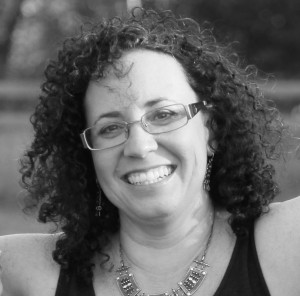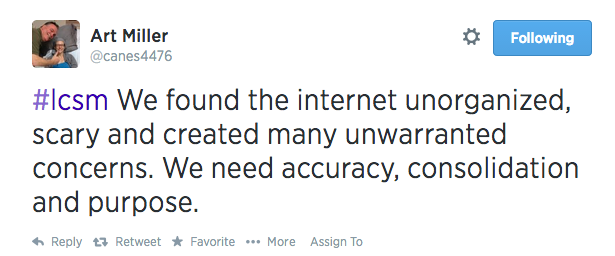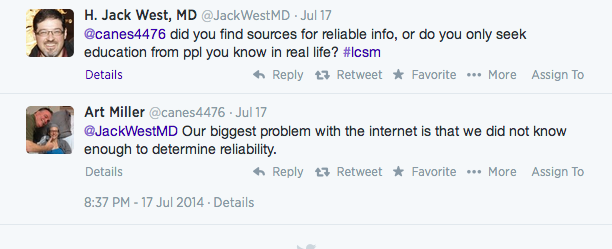How do you share information with your doctor?
This is a tough question. If you have had a bad experience or if you have been afraid to even broach something new with your doctor, this is the post for you.
We asked two patient activists how they talk to their physicians and they provided us with tips that can help when sharing information.
From Patient Experts and Advocates Carolyn Thomas and Lorie Marx-Rubiner
 Start with Carolyn Thomas, author of the blog “Heart Sisters” over the last six years, she has gained some insights into communicating with doctors. In 2008, Carolyn had a heart attack, the type physicians call the “widow-maker.” Her story is chilling. She had actually gone to the hospital two weeks before with classic heart attack symptoms but was sent home misdiagnosed. Unfortunately this is not an uncommon occurrence–women her age and younger are 7 times more likely than men to be misdiagnosed and sent home from Emergency Departments. Because she felt she had wasted the ER doctors’ time, she suffered for two weeks, experiencing ever-increasing symptoms and damage to her heart.
Start with Carolyn Thomas, author of the blog “Heart Sisters” over the last six years, she has gained some insights into communicating with doctors. In 2008, Carolyn had a heart attack, the type physicians call the “widow-maker.” Her story is chilling. She had actually gone to the hospital two weeks before with classic heart attack symptoms but was sent home misdiagnosed. Unfortunately this is not an uncommon occurrence–women her age and younger are 7 times more likely than men to be misdiagnosed and sent home from Emergency Departments. Because she felt she had wasted the ER doctors’ time, she suffered for two weeks, experiencing ever-increasing symptoms and damage to her heart.
At age 35, Lori Marx-Rubiner was diagnosed with Stage II breast cancer. After being NED (No Evidence of
 Disease) for almost 10 years, doctors discovered bone mets. Now Stage IV, Lori is an activist for herself and for others with Metastatic Breast Cancer. As part of her advocacy, she is the president of METAvivor, a group devoted to funding research on metastatic breast cancer. She also blogs at “Regrounding.”
Disease) for almost 10 years, doctors discovered bone mets. Now Stage IV, Lori is an activist for herself and for others with Metastatic Breast Cancer. As part of her advocacy, she is the president of METAvivor, a group devoted to funding research on metastatic breast cancer. She also blogs at “Regrounding.”
Since both women have significant experience in dealing with the medical profession, here are a few tips on how they share information.
![]() “If you know your practice is 10-minutes in and out, make arrangements in advance for more time.”~Lori
“If you know your practice is 10-minutes in and out, make arrangements in advance for more time.”~Lori
![]()
“Let your doctor know you need some extra time, or ask to meet with a nurse practitioner to get answers. Come with your questions ready. (PS YOUR life is on the line, not your doc’s – there are NO dumb questions!)”~Lori
![]() “[When I would share] what I’d learned from a credible resource such as Mayo Clinic, she was open to listening carefully. Had I simply said that I’d Googled something or discovered health advice from a source she deemed to be untrustworthy–Hello, Dr. Oz!– then there’s no way she would have been as open to hearing information that I was sharing with her.”~Carolyn
“[When I would share] what I’d learned from a credible resource such as Mayo Clinic, she was open to listening carefully. Had I simply said that I’d Googled something or discovered health advice from a source she deemed to be untrustworthy–Hello, Dr. Oz!– then there’s no way she would have been as open to hearing information that I was sharing with her.”~Carolyn
![]()
“Do not under any circumstances bring in reams of stuff you’ve printed off the Internet. Nobody wants to plough through a wall of text to find THE POINT.” ~Carolyn
![]() “If you can, email a link to a specific study or article about that study in advance of your doctor’s appointment. If not, bring in a printed copy of a study abstract (including the medical journal’s name, date of publication, etc). Citing the original journal paper is always better than bringing in a newspaper article about that study (headlines are often sensationalized and skewed). ~Carolyn
“If you can, email a link to a specific study or article about that study in advance of your doctor’s appointment. If not, bring in a printed copy of a study abstract (including the medical journal’s name, date of publication, etc). Citing the original journal paper is always better than bringing in a newspaper article about that study (headlines are often sensationalized and skewed). ~Carolyn
![]() “Use Medivizor to send the article ahead so your oncologist can read it and give it some thought.”~Lori
“Use Medivizor to send the article ahead so your oncologist can read it and give it some thought.”~Lori
![]() “Use email to discuss articles between visits. I’ve found this an increasingly convenient way to capture my doctor’s attention when an office visit feels rushed.”~Lori
“Use email to discuss articles between visits. I’ve found this an increasingly convenient way to capture my doctor’s attention when an office visit feels rushed.”~Lori
![]() “Don’t sit on the exam table! Wait in the chair (ideally dressed) where you will feel more at ease, more like a partner in your care.” ~Lori
“Don’t sit on the exam table! Wait in the chair (ideally dressed) where you will feel more at ease, more like a partner in your care.” ~Lori
![]() “Introduce the topic during your appointment with something like this: ‘I find this interesting and I wonder what your opinion of it is?’”~Carolyn
“Introduce the topic during your appointment with something like this: ‘I find this interesting and I wonder what your opinion of it is?’”~Carolyn
Beware of Dr. Google
Of the 87% of Americans that use the Internet, 72% have used it searching for health information. It is natural to search for information anywhere you can find it when you are faced with uncertainty. When Jillian Miller was diagnosed with Stage 4 lung cancer at age 28, her parents went to the Internet. Her father stated on the tweetchat “Lung Cancer Social Media” July 17
Art Miller is not alone in having difficulty with health information on the Internet. It is important to have a relationship with your physician which allows you to ask questions and share what you have learned in your research.
Try these tips from Lori and Carolyn and let us know if they are helpful to you.









Wonderful dreamer!!
Great tips.my onc is always open when I mention studies and can site study details and institution information.
Thank you for your comment. I truly appreciate it!